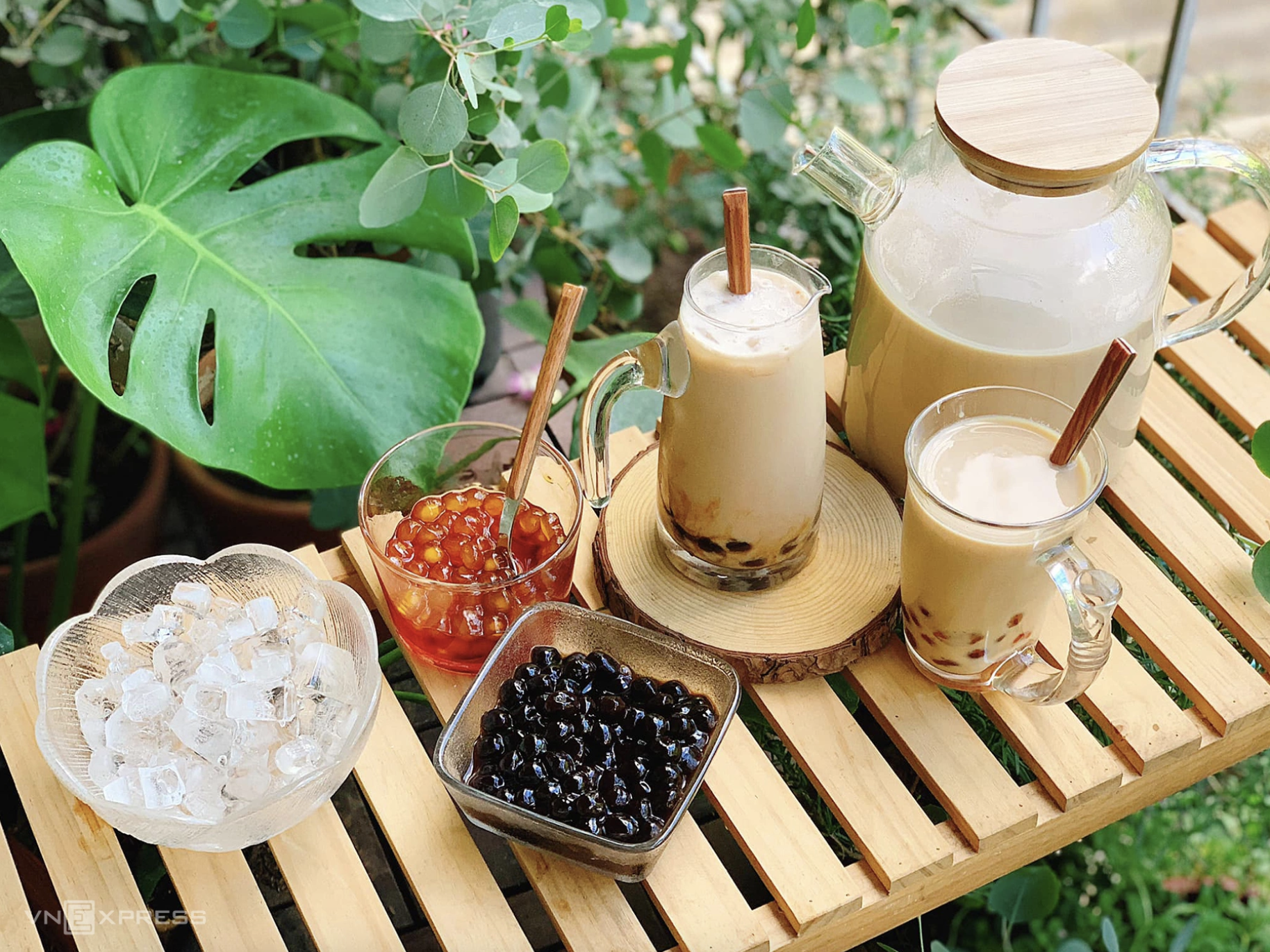For three years, she maintained a habit of drinking at least 3-4 cups of milk tea each week, often choosing large sizes with extra tapioca pearls and maximum sugar, considering it a mental "tonic" after work. Recently, she experienced uncontrolled weight gain, constant fatigue, and thirst.
Test results at Ho Chi Minh City Medicine and Pharmacy Hospital revealed dangerously high blood sugar levels, indicating a potential risk of type 2 diabetes. Doctors warned that the excessive fructose in milk tea, combined with her sedentary lifestyle, was the cause.
"I was truly shocked to learn I was at risk of diabetes, just from my milk tea habit, which I thought was harmless," Ngan said.
Similarly, Mai, a bank employee in Tay Ninh, once proud of her balanced physique, gained 12 kg after three years of milk tea "addiction" and was diagnosed with obesity. Work pressure often led to late-afternoon cravings. She found solace in large cups of milk tea, often adding honey tapioca pearls and cream cheese for "full enjoyment".
Only when her clothes no longer fit, coupled with persistent fatigue and high blood pressure, did Mai seek medical help. She was diagnosed with level two obesity and had to change her diet and increase exercise. "I never thought a few cups of milk tea a week could lead to this," Mai confessed.
She now eats more vegetables, limits rice, and reduced her milk tea intake to 2-3 times a week, though calculations show her sugar intake still exceeds recommended levels.
 |
Customers queue to buy drinks, including milk tea, at a shop in Hanoi. Photo: Pham Nga |
Customers queue to buy drinks, including milk tea, at a shop in Hanoi. Photo: Pham Nga
Health problems like Ngan and Mai's due to milk tea "addiction" are not uncommon. While there are no official statistics on the number of people experiencing complications from milk tea, Dr. Nguyen Trong Hung from the National Institute of Nutrition regularly treats young people with diabetes, dyslipidemia, and obesity. He attributes these primarily to the consumption of fast food, including milk tea.
"There are 9-year-old children with dyslipidemia and 11-12-year-olds weighing 90-100 kg, all due to regular milk tea consumption," Dr. Hung said.
Many young people confess to craving milk tea when they have cravings. This is not physiological hunger but often stems from emotional needs or habits. "Cravings usually involve a desire to eat or nibble on something, even when the body doesn't need energy, simply to relieve boredom, stay busy, or soothe feelings of monotony and stress," said Dr. Phan Thai Tan, a nutrition coach.
Milk tea appeared in Vietnam in 2002, quickly becoming a favorite among young people, despite a period of decline due to concerns about ingredient sourcing and food safety. By 2013, the drink resurged with the arrival of brands from Hong Kong and Taiwan.
According to a 2022 report by Momentum Works and qlub, Southeast Asian consumers spend 3.66 billion USD annually on milk tea. Vietnam ranks third in the region with a market size of 8,500 billion VND, and milk tea is the second most popular beverage (23%), after coffee. The primary consumers are females aged 15-22 (35%).
Nutritionist Truong Nhat Khue Tuong from Ho Chi Minh City University of Medicine and Pharmacy explains that a typical cup of milk tea contains tea, milk, tapioca pearls, jelly, flan, and sugar, providing a large amount of energy. A 500 ml cup can contain 300-500 kcal, equivalent to a bowl of pho.
Tuong also warns that many milk teas use artificial colors and flavors in unknown quantities, potentially harming the liver and kidneys. The fat in milk tea's cream or fat powder is often trans fat, which increases bad cholesterol and decreases good cholesterol, leading to clogged arteries and cardiovascular problems. Caffeine in milk tea can also cause insomnia if consumed in the evening. Milk tea carries a high risk of obesity and diabetes and may even affect male reproductive health.
"Drinking 2-3 cups of milk tea a day is excessive," Tuong stated.
Dr. Tan adds that regular, prolonged milk tea consumption can increase visceral fat, fatty liver, and insulin resistance, leading to prediabetes, dyslipidemia, and fatty liver disease.
A cup of milk tea, especially with many toppings, can have as many or more calories than a main meal, but it doesn't provide a feeling of fullness because it's liquid sugar.
Unlike calories from whole foods, calories from liquid sugar don't effectively activate satiety hormones like leptin or peptide YY. Therefore, even after consuming thousands of kcal from milk tea, the body quickly craves more food.
"This is the trap that makes many young people finish their milk tea and then go for hotpot or buffet as if they haven't eaten anything," Dr. Tan pointed out.
The intense sweetness and industrial fats in milk tea are a "golden formula" for stimulating dopamine production in the brain, creating an immediate feeling of euphoria and pleasure. The brain registers this "quick happiness" experience, forming a craving for repetition - a form of sugar addiction with a mechanism similar to nicotine or alcohol addiction.
The more you drink, the higher the dopamine activation threshold, making the body crave more sweetness and fat, distorting taste buds and affecting gut microbiota.
Excess simple sugars are a favorite food source for bad gut bacteria like Firmicutes - a group of bacteria linked to obesity. This causes gut dysbiosis and reduces beneficial bacteria like Bifidobacteria and Lactobacillus, leading to immune and digestive disorders and increased chronic inflammation.
More seriously, if the intestinal lining is damaged, bacterial toxins can leak into the bloodstream, triggering a systemic inflammatory response. Constantly fluctuating blood sugar increases the production of inflammatory cytokines. Advanced glycation end products (AGEs), formed when sugar binds to protein, accelerate aging, damage blood vessels, and harm the liver and kidneys.
 |
Milk tea is a favorite drink among young people. Photo: Hue Chip |
Milk tea is a favorite drink among young people. Photo: Hue Chip
Doctors recommend gradually reducing milk tea consumption per week to avoid health risks. When drinking, reduce sugar and milk, choose smaller sizes, and buy from reputable, verified sources. Engage in physical activity like exercise or running to control weight, boost metabolism, and strengthen the immune system.
You can make milk tea at home by mixing tea and fresh milk with condensed milk, adding young coconut pieces, fruits, or chia seeds.
After struggling with cravings, Ngan found balance by making her own tea according to recommended recipes. After three months, she quit entirely, stabilizing her blood sugar.
Mai, through exercise and a healthy diet, regained her original physique and improved her health indicators. She still drinks milk tea occasionally but has "broken her addiction." She always requests moderate sugar and goes to the gym to burn off the calories.
My Y












